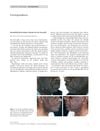 16 citations,
October 1979 in “The Journal of Dermatologic Surgery and Oncology”
16 citations,
October 1979 in “The Journal of Dermatologic Surgery and Oncology” Scalp reduction surgery successfully reduced baldness and improved self-image in a burn victim before hair transplantation.

Tailored nonsurgical cosmetic procedures are crucial for safely treating diverse skin types, especially skin of color.
40 citations,
May 2010 in “American Journal of Clinical Dermatology” AKN might be a skin marker for metabolic syndrome.
 13 citations,
April 2001 in “International Journal of Dermatology”
13 citations,
April 2001 in “International Journal of Dermatology” Different types of scarring alopecia may be stages of one disease, and accurate diagnosis is crucial to prevent permanent hair loss.
 30 citations,
May 2014 in “American Journal of Clinical Dermatology”
30 citations,
May 2014 in “American Journal of Clinical Dermatology” The conclusion is that better understanding and more research are needed to effectively manage follicular and scarring disorders in skin of color, with an emphasis on patient education and cultural awareness.
 178 citations,
August 2016 in “Advances in wound care”
178 citations,
August 2016 in “Advances in wound care” New effective scar treatments are urgently needed due to the current options' limited success.
 105 citations,
April 2004 in “Dermatologic Therapy”
105 citations,
April 2004 in “Dermatologic Therapy” The document concludes that proper diagnosis and a combination of medical, hair-care, and surgical treatments are important for managing alopecia in black women.
 10 citations,
May 2015 in “International Journal of Women's Dermatology”
10 citations,
May 2015 in “International Journal of Women's Dermatology” New treatments for skin and hair disorders in women of color address unique biological differences and include specific acne medications, sunscreens, skin lighteners, and hair care adjustments.
 15 citations,
January 2019 in “International Journal of Women's Dermatology”
15 citations,
January 2019 in “International Journal of Women's Dermatology” Early treatment helps stop hair loss in women of color.
 55 citations,
October 2003 in “Dermatologic Clinics”
55 citations,
October 2003 in “Dermatologic Clinics” Different hair care practices and conditions affect African American hair and scalp health, requiring specialized knowledge for treatment.
 1 citations,
April 2010 in “Expert Review of Dermatology”
1 citations,
April 2010 in “Expert Review of Dermatology” The document concludes that early diagnosis and treatment are crucial for managing rare hair loss disorders and that more research is needed to improve treatment strategies.
 June 2021 in “Journal of The American Academy of Dermatology”
June 2021 in “Journal of The American Academy of Dermatology” The "spade sign" is a highly specific indicator for diagnosing acne keloidalis.
 2 citations,
October 2015 in “Primary Care: Clinics in Office Practice”
2 citations,
October 2015 in “Primary Care: Clinics in Office Practice” Doctors should diagnose hair loss by examining the patient and possibly doing tests, and then treat it based on the type, which may prevent permanent hair loss.
 6 citations,
May 2012 in “Clinical and experimental dermatology”
6 citations,
May 2012 in “Clinical and experimental dermatology” Oral minoxidil can cause inflamed, ingrown hairs in the beard area.
 2 citations,
May 2021 in “European medical journal”
2 citations,
May 2021 in “European medical journal” Botulinum toxins are safe for various medical and cosmetic uses, but more research is needed for long-term safety and effectiveness in hair growth treatments.
 5 citations,
January 2023 in “Journal of the European Academy of Dermatology and Venereology”
5 citations,
January 2023 in “Journal of the European Academy of Dermatology and Venereology” Experts advise using sunscreen and proper skin care before, during, and after procedures to speed healing, prevent complications, and reduce scarring.
 1 citations,
December 2017 in “Journal of clinical and investigative dermatology”
1 citations,
December 2017 in “Journal of clinical and investigative dermatology” Platelet-Rich Plasma (PRP) treatment can significantly increase hair count and thickness in people with Androgenetic Alopecia (AGA) with minimal side effects.
 28 citations,
August 2013 in “Facial Plastic Surgery Clinics of North America”
28 citations,
August 2013 in “Facial Plastic Surgery Clinics of North America” Body and beard hair can be used for hair restoration in severely bald patients, but the technique is complex and costly.
 10 citations,
January 2018 in “Elsevier eBooks”
10 citations,
January 2018 in “Elsevier eBooks” Burn scars heal abnormally and more research is needed to find better treatments.
 July 2018 in “Elsevier eBooks”
July 2018 in “Elsevier eBooks” Acne keloidalis nuchae is a chronic skin condition more common in African men, causing itchy or painful bumps and can lead to permanent hair loss if not treated early.
 22 citations,
June 2002 in “Seminars in cutaneous medicine and surgery”
22 citations,
June 2002 in “Seminars in cutaneous medicine and surgery” Laser hair removal works well for people with dark hair and light skin, but it's less effective for light hair or dark skin; improvements are expected.
 1 citations,
January 1987 in “Journal of The American Academy of Dermatology”
1 citations,
January 1987 in “Journal of The American Academy of Dermatology” The patient's hair loss was likely not caused by beta blockers but possibly by stress or other factors.
 13 citations,
July 2019 in “Pediatric dermatology”
13 citations,
July 2019 in “Pediatric dermatology” Pediatric dermatologists need to understand the unique skin health needs of LGBTQIA youth to provide better care.
 July 2018 in “British Journal of Dermatology”
July 2018 in “British Journal of Dermatology” Mindfulness reduces anxiety and depression in skin disease patients; dermatologists and psychiatrists often lack confidence in treating psychodermatological conditions.
 July 2021 in “Medical journal, Armed Forces India”
July 2021 in “Medical journal, Armed Forces India” Using platelet-rich plasma in hair restoration surgery significantly improves hair density after 6 months and is safe to use.
 April 2024 in “International journal of women's health”
April 2024 in “International journal of women's health” Adult female acne is a complex condition that can worsen with menopause, requiring holistic treatment and tailored skincare at different life stages.
April 2024 in “International journal of molecular sciences” Combination pharmacotherapy is generally more effective for treating keloids and hypertrophic scars.
 7 citations,
October 2013 in “British Journal of Dermatology”
7 citations,
October 2013 in “British Journal of Dermatology” HIV can cause skin disorders, which are often the first sign of infection, especially in people with darker skin.
 49 citations,
March 2014 in “Dermatologic clinics”
49 citations,
March 2014 in “Dermatologic clinics” These skin conditions in African men need combined medical treatments and lifestyle changes.
 34 citations,
November 2008 in “British Journal of Dermatology”
34 citations,
November 2008 in “British Journal of Dermatology” Hair extensions can cause hair loss and scalp damage, and these problems might be more common than people realize.




























